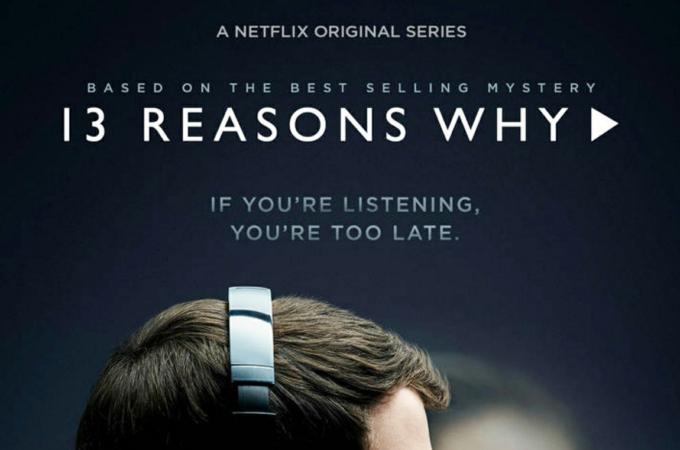Catholic leaders urge extreme caution for new Netflix series
Denver, Colo. (CNA) -- It's only been out for a few weeks, but that's enough time for "13 Reasons Why" to have become the latest teenage Netflix binge craze.
Based on the 2007 young adult novel by the same name, "13 Reasons Why" follows the story of Hannah Baker, a troubled 17 year old who took her own life.
But instead of leaving the typical note, Hannah leaves 13 cassette tapes, explaining the 13 reasons why she took her life -- and each of these "reasons" is a person, who either did something to Hannah, or didn't do enough, according to her.
The creators of the Netflix original series insisted in a follow-up video that 13 Reasons was meant to be helpful -- to bring up important conversations about serious topics like suicide, bullying and assault, and to get viewers talking about solutions to suicidal thoughts.
However, suicide prevention groups and youth leaders have raised concerns because the show is particularly popular among a teenage audience, and teenagers are a vulnerable population.
Suicide is the third leading cause of death among young people between the ages of 10 and 24, according to the CDC. Studies show that publicized suicides may also trigger a ripple effect of additional suicides within communities.
The show has also faced backlash from mental health experts, who say it fails to follow several of the "Recommendations for Reporting on Suicide," a list of guidelines for media outlets developed by suicide prevention experts and journalists. Experts advise against sensational headlines or describing a suicide in graphic detail, which studies have shown can lead to suicide contagion, or "copycat" suicides.
Suicide Awareness Voices of Education, a U.S. non-profit suicide prevention group, has also said that the show may do "more harm than good."
Life Teen, an international youth ministry program, released a video and a written message to young people, warning them of possible triggers in the show and of the inadequate ways it addresses suicide and mental health.
In her message to young people before they watch the show, Life Teen's Leah Murphy warned against the way the show portrays Hannah's suicide as simply the fault of those around her.
"Nowhere in the series is mental illness explicitly discussed or dealt with and the audience is left having been told that the people around Hannah Baker are responsible for her death because of their actions or lack thereof," she wrote.
"While bullying, not saying anything when you see depressive or suicidal signs, and sexual assault are serious issues and can drive people to suicide, the reality is that suicide is rarely something avoided by good sentiments alone. It's been reported that 90 percent of all suicides are committed by people who experience diagnosable mental illnesses. The vast majority of suicides can be traced to actual health issues, not just bullying or traumatic events. These health issues, actual, mental illnesses require a lot more than the presence of a good friend or the absence of any serious issues or struggles -- they require serious, professional help."
The fact that these aren't addressed in any straightforward manner in the series is a problem, Murphy said, because Hannah ends up being portrayed as a kind of "heroic martyr" who leaves a lesson and a legacy behind.
Murphy urged anyone who is experiencing suicidal thoughts to reach out and seek help.
Someone who commits suicide "doesn't become a hero, gain control, and acquire any power by identifying the people around them as reasons for their suicide," Murphy wrote.
"Suicide will always be incredibly hurtful to countless individuals, but most tragically hurtful to the person who takes his or her own life -- a life that was meant to continue, that was full of meaning, purpose, and infinite worth."
Chelsea Voboril, the director of religious education at Good Shepherd Catholic Church in Smithville, Missouri, told CNA that she watched the show and addressed it with her youth group. She was troubled that most of her teens thought the 13 reasons Hannah gave were legitimate reasons to end her life.
Voboril said they were able to discuss how Hannah never approached her parents or a doctor or psychologist about the loneliness and hurt she was experiencing. Voboril was also able to discuss mental health and culpability for sins with her youth group, who asked if everyone who commits suicide goes to hell.
When watching these kinds of shows, Voboril said she tries to take the approach of finding the "wheat in the weeds" or finding the good among the bad -- something she's borrowed from Catholic speaker Christopher West.
The show attempted to have a moral compass, Voboril said, and its "wheat" includes good messages: "Rape is wrong, suicide causes pain, everybody is bearing a cross," she noted.
"But the weeds are dangerous. And subtle. Sex outside of marriage, turning to substance abuse, free will being limited by others actions or circumstances, let alone the huge issue around how to talk about suicide in a safe yet poignant manner."
At the end of the discussion, Voboril said she begged her students to watch it with a parent or other adult, if they were going to continue watching.
But "(for) persons whose consciences may not be well formed or who can be triggered by any of the big issues, I would hope that they avoid it."
If you think you or a friend is struggling with suicidal thoughts, ask for help from someone you can trust and/or call the National Suicide Prevention Lifeline at 1-800-273-8255 (available 24 hours everyday). For Catholic counseling, contact your local priest, diocese or your local branch of Catholic Charities.



















